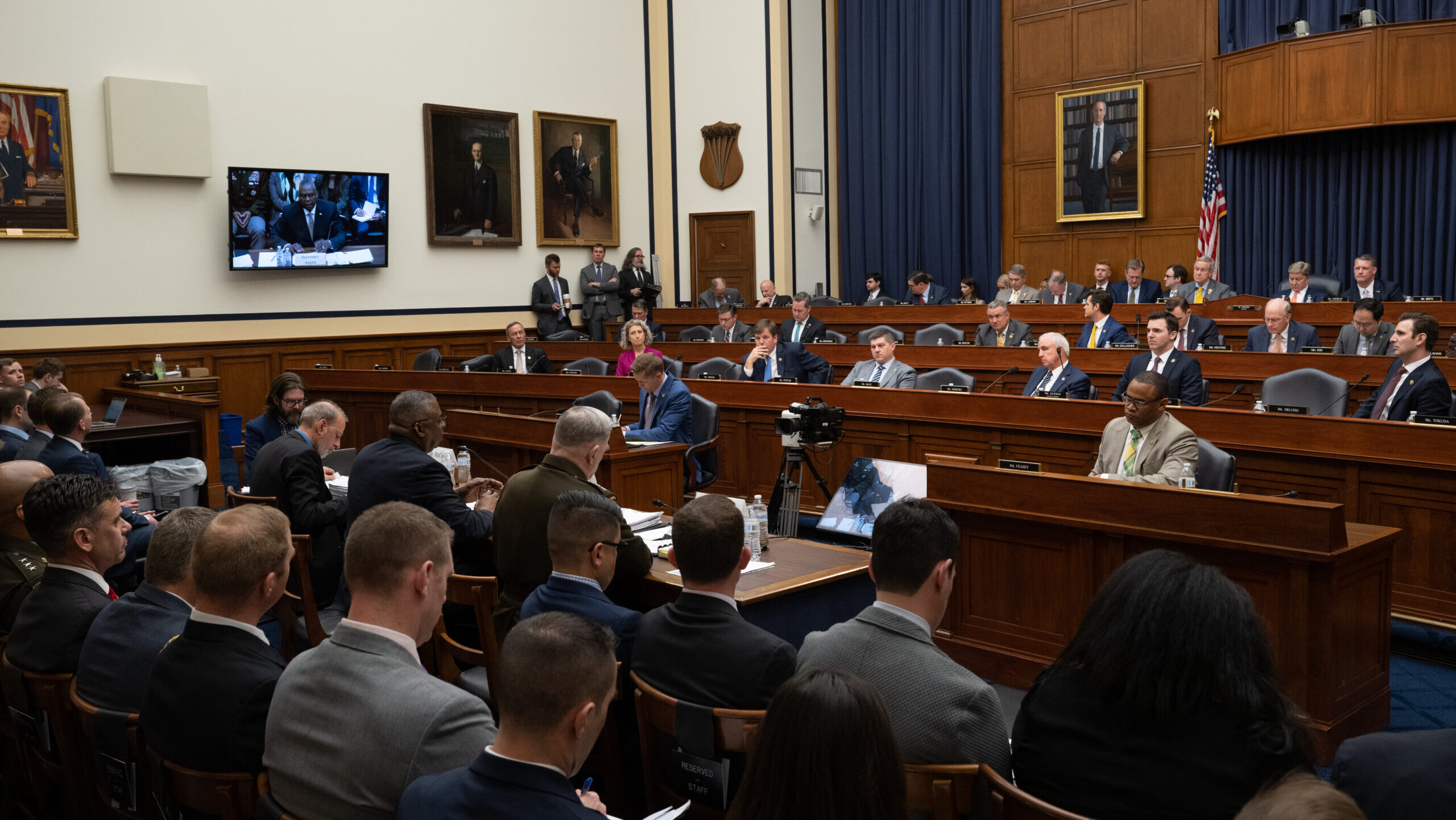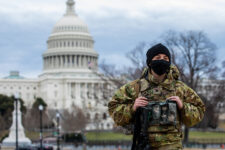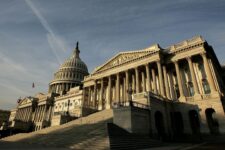
Secretary of Defense Lloyd J. Austin III, Chairman of the Joint Chiefs of Staff U.S. Army Gen. Mark A. Milley, and Under Secretary of Defense (Comptroller) Michael J. McCord provide testimony at a House Armed Services Committee hearing on the fiscal year 2024 Department of Defense budget request. (DoD photo by U.S. Air Force Staff Sgt. John Wright)
With the government open through mid-November under a continuing resolution, leaders of the House and Senate Armed Services Committees are hopeful they can pass a National Defense Authorization Act in the coming weeks. Among the topics to be discussed: strengthening Buy America rules focused on protecting domestically-made defense articles. In the following op-ed, acquisition expert Bill Greenwalt says that rather than helping American interests, these Buy America rules would harm national security.
The sprint to the finish line for the National Defense Authorization Act (NDAA) is on. While the Senate has yet to officially name conferees, Senate (SASC) and House (HASC) Armed Services Committee members and staff are already working through conflicting proposals. And as with many past bills, the issue of Buy America and whether to unleash new trade barriers in the US defense market will have to be addressed.
Historically, protectionist measures have overwhelming originated in the House and were ultimately unsuccessful, as the Senate, the Department of Defense, and the US defense industry pushed back, thus ensuring American access to allied defense markets and technology. But this year looks different.
Industry has been notably quiet, while DoD objections appear to have been muzzled at OMB by what may be the most protectionist administration since Herbert Hoover’s, and the contemporaneous passage of the 1930 Smoot-Hawley Tariff Act and the 1933 Buy American Act. Most ominously, many of the Buy America provisions are coming from the Senate, and it is doubtful that a MAGA and union-influenced House will offer much resistance.
At a time when the United States is falling behind China technologically, it needs its allies more than ever. Yet the administration and Congress are sending the opposite signal. Only our potential adversaries benefit from this misguided policy.
Our allies would be right to start panicking. In a recent — and far too diplomatically stated — letter to the SASC and HASC chairs and ranking members, 25 of America’s closest allies and defense trading partners outlined their concerns with domestic content requirements in the NDAA. Our allies’ unease is likely intensified by the resurgence of support for a potential second Trump administration and a fear of what that would mean for the future of US alliances and defense cooperation.
What our allies may be missing is that the problem is already here. At least with respect to Buy America, the last administration was rather kind to our allies despite all the over-the-top rhetoric. Steel and aluminum tariffs and construction material content requirements aside, defense goods were not targeted. It was instead President Joe Biden who unilaterally issued an executive order that set in place the increasing of Buy American thresholds within one week of being in office.
These rules disproportionately impact defense products, given our commercial trade treaty obligations, and are the same thresholds that the SASC had prevented from being raised for over three decades. In the same executive order, a new Orwellian-inspired “Made in America Office” (MIAO) was created and empowered to rigidly enforce existing protectionist measures as it dreams up new ones.
The pressure for both parties to outdo themselves in pandering to populism is at fever pitch, and it’s only going to get worse as the 2024 presidential election nears. It’s no wonder that protectionists and isolationists in both chambers have decided to up the ante this year on the NDAA.
We have reached the Buy America Rubicon just when leadership against defense protectionism has evaporated. Unlike former internationalist champions, such as former SASC chairmen John Warner and John McCain who stared down their protectionist colleagues for decades, current SASC Chairman Jack Reed appears to have thrown in the towel on this year’s bill. The most egregious of the SASC Buy America provisions is Senator Tammy Baldwin’s amendment, added on the Senate floor at the last minute, which would exclude all foreign content from US naval ships. This provision has no exemptions, although it does include a likely-unworkable waiver process that applies to just four countries and would seem destined to struggle with the MIAO that has to approve any waiver request.
The House, of course, has its own domestic source mandates, and the worst of these is Congressman Donald Norcross’s provision that largely enshrines into law what the Biden administration has already foolishly adopted in regulation. But in a sign of how topsy-turvy, things have become, the House provision is actually calmer than the Senate concepts, as it at least provides clear exemptions for our closest allies.
One should make no mistake that these and other Buy America provisions will be cost-free. The impact of restricting defense cooperation with our allies will be significant as they will eventually retaliate. By protecting our market, we are encouraging countries to stop buying from the United States and to increase the production of their own defense items. That will lead to increased prices and the loss of jobs in the US.
This is also exactly the wrong time to go full-on protectionist. Based on planned spending triggered by Russian and Chinese aggression, in the next five years the allied defense market (NATO plus Indo-Pacific allies and partners) is likely to be for the first time greater than the US, and these countries collectively can afford to spend a lot more than this. Ukraine and the closing off of the South China Sea are continuing to provide the incentives to do so. For the moment, American systems are the weapons of choice, but only because we are still considered to be open to reciprocally buying from our allies. Buy America will put an end to that idea.
And the harm is far from just economic, as Congress will be closing off the opportunity to acquire the best technology for our military personnel. It may come as a surprise to some but many of our allies have better technology than is made in the United States, particularly when it relates to ship components which are the subject of the Baldwin amendment. Chinese missiles and drones will be targeting those ships, and the lives of our sailors and marines will depend on obtaining the best solutions. It would be a tragedy if they were put in harm’s way because the US Navy was forced to buy inferior equipment that propped up a job somewhere in Wisconsin or Virginia.
The Senate has always been the adult in the room holding back protectionism, although many members were happy to hide behind McCain and Warner on this issue. With the passing of that generation, current leaders look pitifully small in their lack of support for our allies. It’s also just as disappointing to see US industry not engaging. Export orders for F-16s, M1A2s, and AH-64s don’t grow on trees and our allies will not just willy-nilly keep buying US products that support 25 percent of sales (and therefore jobs) at major US primes. The few jobs created in protected shipbuilding components will pale in comparison to what will be lost in a subsequent Buy European, Buy Asian, or Buy National reaction.
Rather than engage in blatant protectionism, the SASC and HASC should provide broader exemptions to any existing domestic source restrictions for those close allies who reciprocally commit to keeping their markets open. We should be primarily focused on keeping China out of our defense supply chain, which, critically, the Buy American Act does not do. As the NDAA conference proceeds, hopefully cooler heads will prevail and new Buy America provisions will be rejected. Rather catastrophically, that is not the likeliest course as things now stand.
William C. Greenwalt is a nonresident senior fellow at the American Enterprise Institute and a former deputy undersecretary of defense for industrial policy.
Congress unveils stopgap funding bill with $5.7 billion for Virginia-class subs
Congress has until Friday night to pass the continuing resolution before federal spending runs out, giving lawmakers a tight timeframe to move through procedural hurdles and avert a government shutdown.


























